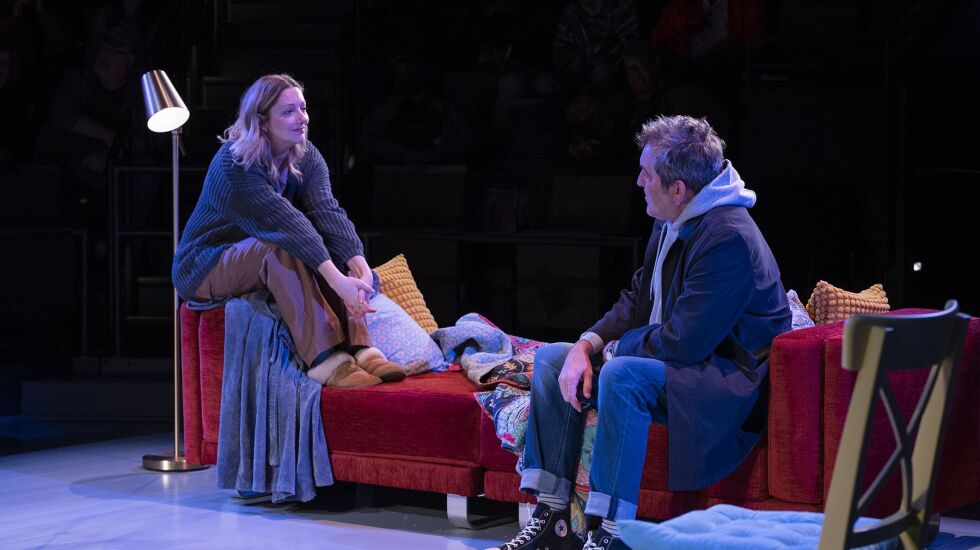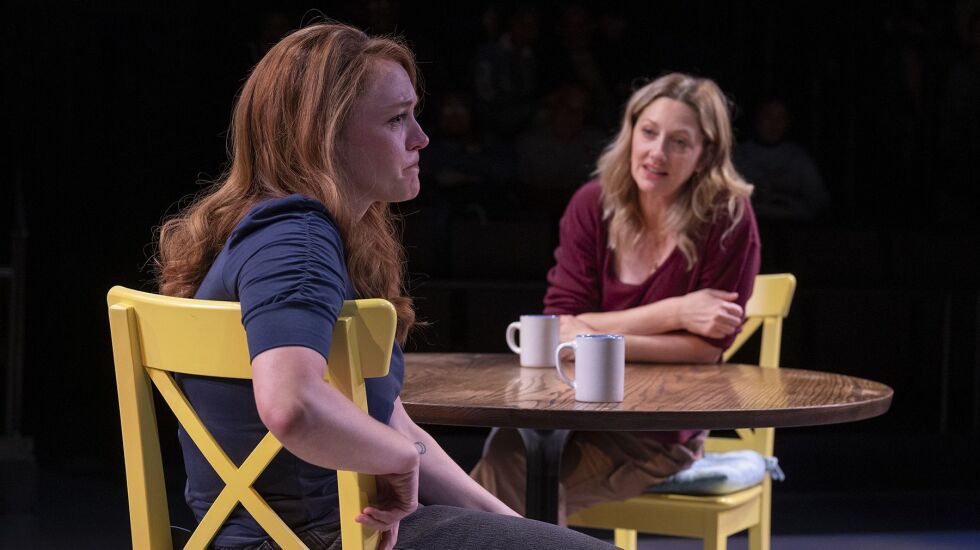
Steppenwolf Theatre ensemble member Kate Arrington’s debut as a playwright is by turns maddening, opaque, laugh-out-loud funny and drenched in pathos. “Another Marriage,” running through July 23 at Steppenwolf, is also disjointed and at times tough to follow. While there’s a feast of emotion on stage, the messy romance at the heart of Arrington’s script lacks focus even when all those emotions ring inarguably true.
Directed by Terry Kinney, “Another Marriage” delivers a romantic triangle that veers between realistic and relatable to tough to engage with. As the audience follows two aspiring writers, Nick (Steppenwolf ensemble member Ian Barford) and Sunny (veteran TV/film actress Judy Greer), from their meeting on the college campus quad to married with child, Kinney gets stellar performances from his tight, four-person cast. There isn’t a character on stage who isn’t easy to empathize with, but the script doesn’t give them what they need to propel the audience through an ensemble drama.
Greer’s effervescent, charismatic Sunny is at the heart of the drama. Often relegated to “best friend” tracks in the movies, Greer shows she can more than hold her own as the main attraction. From relatively carefree student to mother of a teenager, Sunny’s life passes by, marked by supertitles above the in-the-round stage: 1998, on the quad. Six months later. Five years later. And so on.
She meets Nick in 1998 and embarks on a relationship that will progress through marriage, a child, an affair, separation, divorce and countless reconciliations and quasi-reconciliations. With the supertitles indicating the passage of time between 1998 and 2015, Nick and Sunny reveal a relationship that’s as constant as the weather. Ultimately, they move toward an untidy ending that defies happily-ever-after closure.

Sitting in their apartment, Sunny and the now-successful author Nick are often being watched by their invasively observant teenage daughter Jo (Nicole Scimeca), who stalks the stage with a flickering iPad, her restless fingers forever tapping and scrolling as she observes (and sometimes comments on) her parents’ volatile relationship.
The fourth person in the intricately woven quartet is the literary assistant Macassidy (Steppenwolf ensemble member Caroline Neff). Her mercurial entanglement with Nick (getting any more specific would result in spoilers) profoundly alters his relationship with Sunny and Jo. More importantly, it also sets the stage for several killer scenes between Greer and Neff, as Sunny and Macassidy try to puzzle out how to move forward while bound to the exasperating, alluring Nick.
The cast elevates Arrington’s script, smoothing over the often bumpy time transitions and making every character feel complex, or at least relatable, even when the script’s dramatic arc falters. A fundamental issue is the conversational nature of every scene; there’s a lot of talking and a lesser amount of doing. The production would be mired in occasional stasis with a lesser cast, but this group makes every last bit of rage or frustration or heartbreak resonate.
Greer is a force as Sunny, an Everywoman trying to keep her family intact even as its members seem intent on drifting away. She alternates between heartwrenching and hilarious, and finds the truth in whichever point on the emotional spectrum the dialogue calls for.
Neff’s sometimes childlike, emotionally volatile Macassidy is a delight from entrance to exit, even though her infatuation with Nick — like his infatuation with her — never seems entirely grounded in truth.
As Jo, Scimeca is at once surly, earnest and sometimes frightening in her intensity; she’s also utterly recognizable to anyone who was ever an adolescent. Barford’s Nick, meanwhile, is gruff and reactive as he bounces between Macassidy and Sunny. Nick often seems like a supporting role in his own life story: The light in “Another Marriage” shines squarely on its women.
Robert Brill’s clever set design literally keeps the action moving. A slowly rotating turntable turns Sunny and Nick’s bedroom and kitchen into literal reminders that life is cyclical and what goes around can literally come back around.
As playwriting debuts go, “Another Marriage” is solid if not spectacular. From college to family, the ballad of Sunny and Nick is often relatable and engaging. But it’s also disjointed. Arrington’s script needs tightening and focus before it truly shines.







